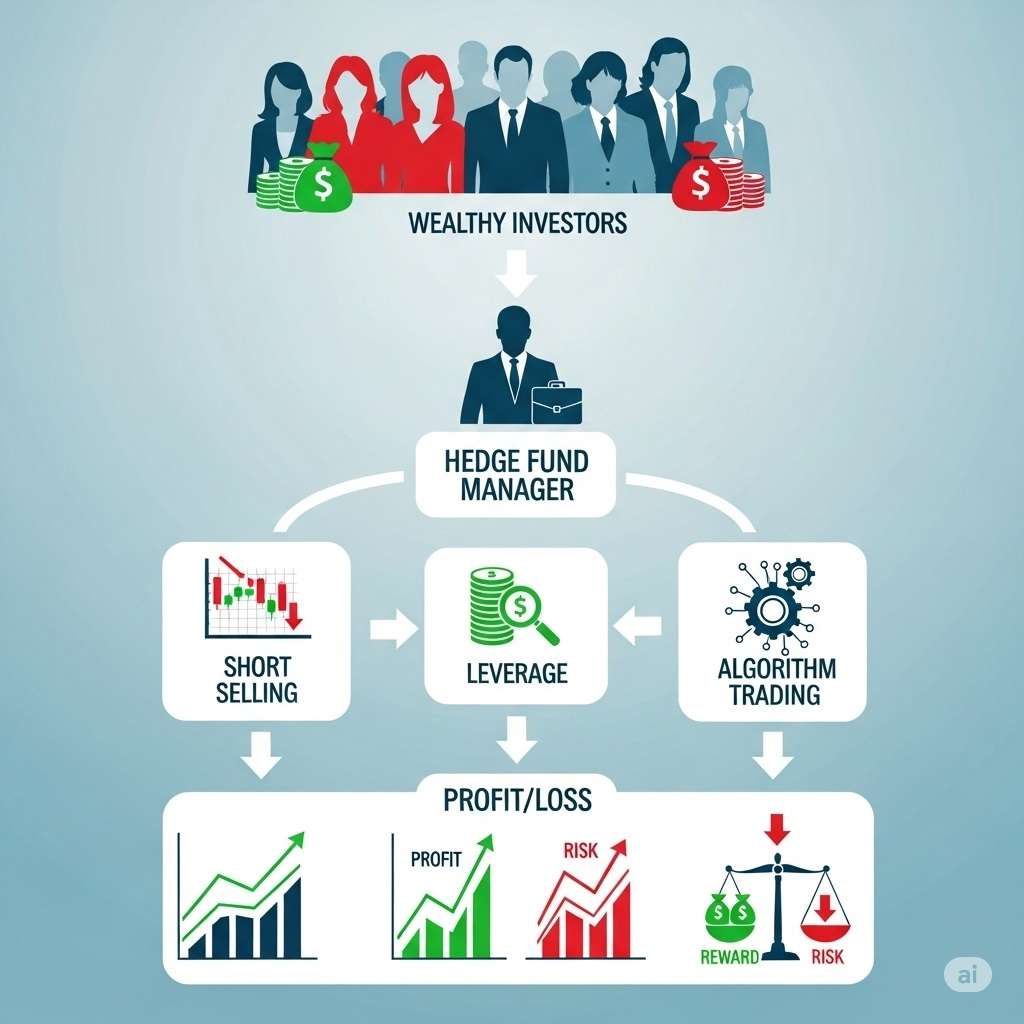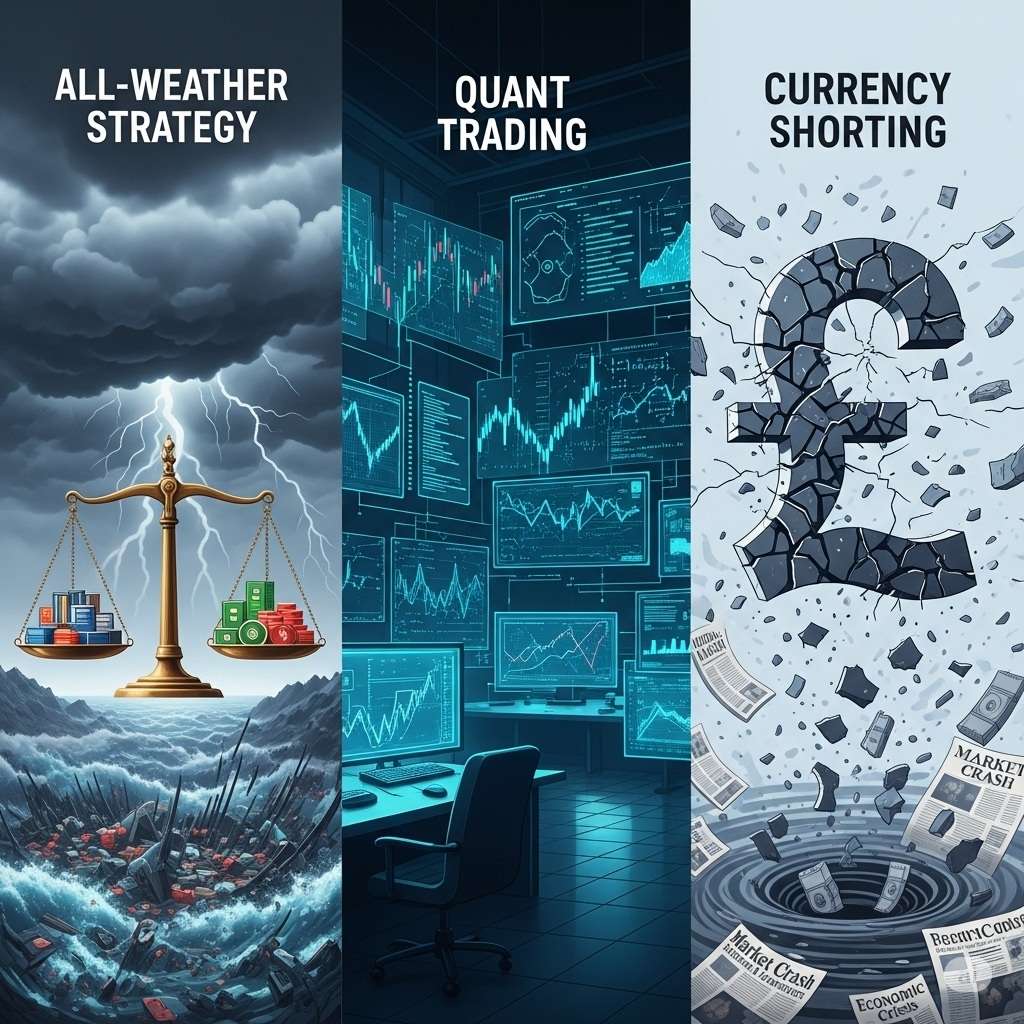- 29 July 2025
- No Comment
- 439
How Hedge Funds Work: Inside the Billionaire Money Machine

Ever Wondered How the Ultra-Rich Grow Their Wealth Even in Market Crashes?
While most of us panic when the stock market takes a dive, there’s a small circle of elite investors quietly smiling and even profiting. Welcome to the secretive, high-stakes world of hedge funds, a place where billions are moved behind the scenes, and fortunes are made (or lost) in the blink of an eye.
You won’t see hedge funds advertising on your TV screen. You can’t just hop online and invest in one like you would a mutual fund or ETF. But they play a massive role in shaping the financial markets and the economy and that makes understanding them worth your time.
So let’s demystify this financial powerhouse. We’ll break it all down: what is a hedge fund, how hedge funds work, famous hedge fund managers, hedge fund strategies, and why they matter, even to those of us who’ll never be allowed to invest in one.
What is a Hedge Fund?
Imagine a private, invite-only investment club for millionaires and billionaires, run by some of the sharpest minds in finance. That’s basically what a hedge fund is.
A hedge fund is a private investment partnership that uses aggressive and often unconventional strategies to maximize returns. While regular folks invest in mutual funds or retirement accounts, hedge fund investors are typically accredited investors, people with high incomes or net worths.
Hedge funds don’t play by the same rulebook. They have fewer regulations, which means more freedom, but also more risk.
Think of it like this:
Hedge Funds vs Mutual Funds
- Mutual funds/ETFs = safe sedans 🚗
- Hedge funds = turbocharged race cars 🏎️
They’re not meant for everyone, but when they work, they work big.
History of Hedge Funds
The idea goes all the way back to 1949, when a guy named Alfred Winslow Jones had a lightbulb moment.
His hedge fund strategies?
- Buy stocks he thought would rise
- Short stocks he thought would fall (that means betting against them)
By doing both, he believed he could “hedge” his bets, reducing risk while trying to profit in any market condition. And boom, hedge funds were born.
Fast forward to today, and hedge funds have evolved into global giants handling trillions of dollars.
Who Runs the Hedge Fund
Hedge funds aren’t automated money machines. Behind every one is a small army of specialists:
- Fund Managers – The brainpower making big investment decisions
- Analysts & Researchers – Digging deep into data and trends
- Risk Managers – Keeping an eye out for financial storms
- Legal Teams – Making sure they don’t accidentally burn the house down
Investors are mostly the ultra-rich individuals, university endowments, pension funds, and foundations. Hedge funds may seem like exclusive clubs, but their decisions can impact entire sector and even affect your investments.
How Hedge Funds Work
So, how do hedge funds make money? Well, they don’t just buy stocks and wait for them to go up like most regular investors do. Hedge funds are known for using some pretty creative and risky methods to grow money fast.
Let’s walk through some of the common strategies they use, one by one, in simple terms.
1. Short Selling – Betting on a Stock to Fall
This one flips the usual logic of investing. Instead of hoping a stock will go up, hedge funds sometimes bet it will go down. Here’s how:
- They borrow shares of a company’s stock and sell them right away.
- If the stock price drops, they can buy it back at a lower price, return the borrowed shares, and pocket the difference.
Example:
If they short a stock at $100 and it drops to $70, they make $30 per share.
But if it goes up to $120 instead? Ouch—they lose $20 per share!
It’s risky, but when they get it right, the returns can be huge.
2. Leverage – Investing With Borrowed Money
Imagine you had $1,000 but wanted to invest as if you had $5,000. That’s what leverage is borrowing money to invest more than you actually have.
- If the investment goes well, your profits are much bigger.
- But if it goes badly, your losses are also multiplied.
Think of it like using a credit card to invest. Great if it works. Disastrous if it doesn’t.
3. Derivatives Trading – Betting on What Might Happen
Hedge funds also use tools called derivatives—like options, futures, and swaps. These are basically contracts that let them bet on what might happen to a stock, currency, or commodity price in the future.
- They don’t own the actual asset—they just make money based on whether the price moves up or down.
- These tools can be used to protect investments or to make bold, high-risk plays.
Picture this like side bets in a card game—if you’re smart (and lucky), they pay off big.
4. Quantitative Strategies – Using Math, Data, and Algorithms
Some hedge funds rely on super smart computers that scan the market 24/7. These computers look for tiny price patterns and make trades in fractions of a second.
- This is called quant trading (short for quantitative).
- It’s based on algorithms, artificial intelligence (AI), and statistical models.
It’s like having a robot do your investing—but only after training it with tons of data.
5. Global Arbitrage – Taking Advantage of Price Differences
Sometimes the same asset is priced differently in different parts of the world. Hedge funds will buy it cheaper in one market and sell it higher in another, locking in profit with little or no risk.
Imagine buying a PlayStation in Dubai for $400 and selling it in the U.S. for $500. That $100 difference? That’s arbitrage.
- Hedge funds do this with stocks, currencies, and even government bonds.
- It requires speed, access to global markets, and deep research.
6. Investing in Alternative Assets – Beyond Stocks and Bonds
Hedge funds don’t stick to the usual investment options. They’ll also put money into real estate, artwork, vintage wine, music rights, and even rare collectibles.
- These are called alternative assets.
- They’re less affected by stock market ups and downs, so they can help balance risk.
Example: A hedge fund might buy the rights to a popular music catalog. Every time that song gets streamed or used in a commercial, they get paid.
What’s the Point of All This?
In one sentence: Hedge funds try to make money no matter what’s happening in the market.
- If stocks go up, they want to profit.
- If stocks go down, they still want to profit.
- If things stay flat, they look for opportunities outside the stock market.
That’s why hedge funds are so powerful, but also why they’re risky.
One Last Thing: Risk and Reward Go Hand in Hand
All of these hedge fund strategies might sound smart and sophisticated, but they’re also high-stakes games. The potential profits are huge, but so are the potential losses.
Just remember this basic rule:
The more money you hope to make, the more risk you’re usually taking.
How Much Hedge Fund Managers Earn?
A lot. Like, a lot a lot.
Most hedge funds charge fees based on the “2 and 20” model:
- 2% Management Fee – Just for handling your money
- 20% Performance Fee – A cut of any profits they make
Let’s say you invest $1 million. Even if they don’t earn anything, they pocket $20,000 per year. If they earn $100,000 in profits, they take $20,000 of that too.
Critics argue this model rewards managers too generously, especially when the fund doesn’t perform well. But it’s still the norm in the industry.
Big Names in the Hedge Fund World
Let’s meet a few legendary hedge fund titans and the empires they built:
Ray Dalio – Bridgewater Associates
Ray’s philosophy? Prepare for anything.
He created the famous “All Weather” strategy that spreads investments across stocks, bonds, and commodities to ride out market storms. Bridgewater is now the world’s largest hedge fund, managing over $100 billion.
Jim Simons – Renaissance Technologies
A math genius and former codebreaker, Simons uses algorithms and data models to spot market patterns no human could see. His Medallion Fund reportedly delivers insane returns—but it’s closed to outsiders.
George Soros – Quantum Fund
Known for “breaking the Bank of England,” Soros made over $1 billion in a single day by shorting the British pound. Some called him a financial hero, others called him dangerous—but everyone remembers the move.
Risk of Hedge Funds
For every big winner, there’s a hedge fund horror story. One of the most famous?
Long-Term Capital Management (LTCM)
LTCM started strong with mind-blowing returns in its early years. But by 1998, it had lost $4.6 billion in just four months, thanks to over-leveraging and exposure to global financial crises.
It almost crashed the entire financial system and had to be bailed out. It’s a cautionary tale: when hedge funds go wrong, the fallout can be massive.
Are Hedge Funds Ethical?
This is where things get murky.
Critics say:
- Hedge funds profit from financial crises
- They manipulate markets
- They sometimes engage in insider trading
On the flip side:
- They add liquidity to markets
- They help correct mispriced assets
- They challenge underperforming companies
There’s also the rise of activist hedge funds, which buy big stakes in companies and push for major changes, sometimes boosting performance, other times causing layoffs.
So… are they saviors or sharks? Depends on who you ask.
Why You Should Care (Even If You’ll Never Invest in One)
Here’s the thing: even if you don’t qualify to invest in a hedge fund, their actions still impact you.
Hedge funds:
- Influence stock prices
- Push companies to change strategy
- React to economic shifts, sometimes steering entire markets
They’re not just playgrounds for the rich. They’re powerful forces in the global economy and understanding how they work gives you a leg up in your own financial journey.
Final Thoughts: Hedge Funds Are Powerful but Not Magical
At the end of the day, hedge funds are tools. Like any tool, they can build or destroy depending on who’s holding them.
They aren’t guaranteed paths to riches. They’re not evil empires, either. They’re high-stakes, high-skill vehicles that, when used well, can turn millions into billions even when the market is crashing.
And while most of us may never invest in one directly, knowing how they operate makes you a smarter investor and a more informed citizen in a world where money truly moves everything.





